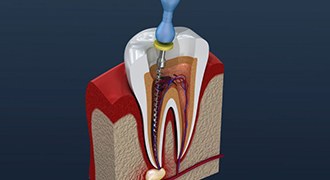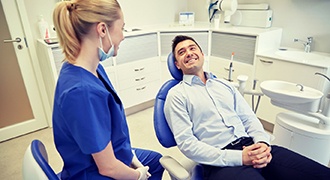When it comes to dental services, there are few phrases more dreaded than “root canal.” However, these treatments make it possible for our team to repair damaged teeth and avoid unnecessary tooth extractions. The bad reputation root canals have likely stemmed from the toothache that precedes them rather than the treatment itself. At our office, our dentist and team have years of experience working with patients to preserve their optimal level of oral health. When Dr. Donna Franklin-Pitts recommends root canal therapy, she will carefully explain the entire process, so you can feel completely comfortable and confident in the treatment choice. If you have questions about root canal therapy, keep reading to see if we address any of your concerns, or give our team a call to schedule a consultation.
 Root canals are necessary when tooth decay, a chip or crack, or other dental trauma reaches deep inside the tooth to the innermost layer. Known as the pulp, this soft tissue houses the entire nerve system of the tooth. Because the nerve is accessed directly by damage or decay, a painful toothache and sensitivity to temperature changes may occur. Root canal therapy is recommended in these situations to relieve pain and preserve what healthy dental structure remains.
Root canals are necessary when tooth decay, a chip or crack, or other dental trauma reaches deep inside the tooth to the innermost layer. Known as the pulp, this soft tissue houses the entire nerve system of the tooth. Because the nerve is accessed directly by damage or decay, a painful toothache and sensitivity to temperature changes may occur. Root canal therapy is recommended in these situations to relieve pain and preserve what healthy dental structure remains.
 While dental professionals are the only ones who can definitively say whether you need a root canal, there are certain signs to watch out for that may indicate one is required. Give us a call right away if you notice any of the following:
While dental professionals are the only ones who can definitively say whether you need a root canal, there are certain signs to watch out for that may indicate one is required. Give us a call right away if you notice any of the following:
 Dr. Franklin-Pitts will administer local anesthesia to numb the area around the affected tooth. We can also offer nitrous oxide sedation for patients who need a little extra help relaxing during their appointment. Once you are comfortable, Dr. Franklin-Pitts drills a small access hole from the top of the tooth to the inner layer. We use a series of specialized tools (called files) to extract the entire pulp and nerve structure as well as any other damaged tissue. Next, we refill the tooth with a biocompatible substance of similar quality. Then the access hole is refilled. In most cases, we place a dental crown to protect and strengthen the treated tooth.
Dr. Franklin-Pitts will administer local anesthesia to numb the area around the affected tooth. We can also offer nitrous oxide sedation for patients who need a little extra help relaxing during their appointment. Once you are comfortable, Dr. Franklin-Pitts drills a small access hole from the top of the tooth to the inner layer. We use a series of specialized tools (called files) to extract the entire pulp and nerve structure as well as any other damaged tissue. Next, we refill the tooth with a biocompatible substance of similar quality. Then the access hole is refilled. In most cases, we place a dental crown to protect and strengthen the treated tooth.
 While the procedure itself shouldn’t hurt, it’s perfectly normal to experience some swelling and soreness for a few days following your root canal. If we prescribe any pain medication, take it as directed. You could also apply a cold compress to your cheek in 10-minute intervals for up to an hour at a time to curb both pain and swelling. It may help to stick to a soft food diet for the first few days until you feel comfortably eating with your treated tooth again. Just be sure to avoid chewing anything particularly hard or sticky so that you don’t dislodge your dental crown.
While the procedure itself shouldn’t hurt, it’s perfectly normal to experience some swelling and soreness for a few days following your root canal. If we prescribe any pain medication, take it as directed. You could also apply a cold compress to your cheek in 10-minute intervals for up to an hour at a time to curb both pain and swelling. It may help to stick to a soft food diet for the first few days until you feel comfortably eating with your treated tooth again. Just be sure to avoid chewing anything particularly hard or sticky so that you don’t dislodge your dental crown.

Since every root canal is different, the cost of getting one varies from case to case. During your consultation, we will assess your oral health and deliver a personalized estimate of what you can expect to pay. While the procedure might seem costly at first, it can end infections, relieve pain, and prevent tooth loss and is usually covered at least partially by insurance. Here’s a guide to the factors that affect the cost of a root canal.

We’ll only be able to provide you with a proper cost estimate after we’ve assessed the tooth or teeth to be treated. A few factors that contribute to the total price of a root canal include:

While it might seem tempting to forgo a root canal by having the pained tooth extracted instead, this can cause more problems than it solves. While tooth extractions may seem cheaper initially, the loss of a tooth can lead to a range of oral health problems such as atrophy of the jawbone, greater risk of gum injuries, and the neighboring teeth being pulled out of alignment. Dentists typically recommend replacing lost teeth as soon as possible to prevent these issues, and restorations like dentures, crowns, bridges, and dental implants can be quite costly.
A root canal, on the other hand, can eliminate an infection at its source, end severe dental pain, and prevent the tooth from needing extraction. Keeping your natural tooth is always preferable to needing to replace it, and waiting to get a needed root canal can lead to your tooth needing to be extracted anyway. It’s best not to delay booking your consultation if you think you might need a root canal.

Dental insurance plans usually cover root canals at least partially since they are considered major restorative procedures. This coverage usually ranges from 50% to 80% after the deductible is met, and we’ll be more than happy to go over your insurance policy with you to help you understand what it will pay for and get the most out of it.

To help patients on a budget, we offer financing options through LendingClub, a trusted third-party financier that can break your bill into smaller monthly installments with little or no interest. We also accept Medicaid and CHIP from qualifying patients. If you need any help understanding your payment and financing options, our staff will be happy to help.
Fortunately, there are several ways you can dramatically reduce your chances of needing root canal treatment. That starts with a comprehensive oral hygiene regimen, including brushing twice a day, flossing daily, and rinsing with an antimicrobial mouthwash each evening. There are also a few things you should do on an ongoing basis, like visiting us every six months for a checkup and cleaning, wearing a mouthguard when playing sports, and avoiding unhealthy habits, like smoking.
The longer you wait, the worse the root of the problem gets. In other words, if you wait too long to get root canal treatment, then you’ll likely need even more invasive and costly care. In fact, the dental damage may progress to the point where saving your tooth is no longer an option. Therefore, we will need to extract your tooth instead and put a dental bridge or implant in its place.
When you get home, you likely won’t feel any discomfort since the numbing agent is still working. However, a few hours later it will wear off, resulting in some soreness. The good news is that the aftercare instructions we give you are designed to prevent irritation (as well as an infection). So, make sure to follow them to a tee and reach out to us with any questions you have.
Although dental pain is a common symptom of a severely decayed tooth, there are also other warning signs, including bleeding gums, dark discoloration on one or more of your teeth, and a pimple-like bump or blister on your gums. So, even if you aren’t struggling with a persistent toothache or pain when biting down, you may still need a root canal to restore your oral health.
There is a common myth that root canals make you sick, which stems from a study conducted back in the 1920s. At the time, a dentist, Dr. Weston Price, claimed that it was better to extract a tooth since root canal treatment didn’t remove all of the bacteria. However, his research was poorly designed and has been debunked for decades now. Simply put, there is no scientific evidence that root canals make you sick.